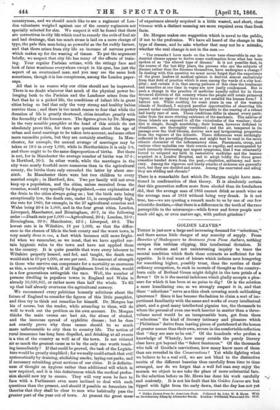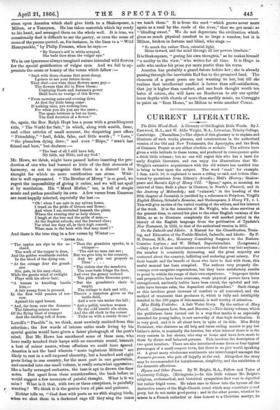GOLDEN LEAVES.*
THERE is just now a large and increasing demand for "selections," and there seems little danger of any scarcity of supply. From Beauties of Shakespeare to Sentences from Pious Authors, nothing escapes this ruthless clipping, this intellectual dictation. It were a curious and not uninteresting inquiry to trace the mental condition which finds these extracts so sufficient for its appetite. Is it real want of leisure which induces men hungering for something higher, possibly truer, than the routine of their ordinary occupation, to suck in morsels of thought as the country- born exile of Bethnal Green might delight in the torn petals of a flower ? Or is it the mental indolenee which gladly accepts a plea- sure for which it has been at no pains to dig? Or is the solution a more humiliating one, as we strongly suspect it is, and that these " selections " serve as a thin cloak covering much unblushing ignorance ? Since it has become the fashion to claim a sort of im- pertinent familiarity with the name and works of every intellectual giant, and a good many intellectual pigmies too, the thousands to whom the perusal of even one work heavier in matter than a three- volume novel would be an inexpressible bore, get from these " selections " the kind of literary intimacy and pleasure which "Philistines" derive from leaving pieces of pasteboard at the homes of greater names than their own, secure in the comfortable reflection that " they are sure to be out." Of the hundreds who profess a knowledge of Whately, how many outside the purely literary class have got beyond the " Select Sentences." Of the thousands who talk of Goethe's convictions, how many know more of them than are revealed in the Conversations? Yet while fighting what we believe to be a real evil, we are not blind to the distinctive merits of the different beauties thus carefully from time to time arranged, nor do we forget that a well fed man may enjoy the morsels we object to see take the place of more substantial fare. In the selection before us Mr. Hows has done his work carefully and zealously. It is not his fault that his Golden Leaves are but tipped with light from the early dawn, that the day has not yet • Golden Leaves from the American Poets. Collected by John W. S. Hons. With an Introductory Essay by Alexander Smith. London : Frederick Warne and Co. ISA
risen upon America which shall give birth to a Shakespeare, a Milton, or a Tennyson. He has taken materials which lay ready to his hand, and arranged them on the whole well. It is true, we occasionally find it difficult to see the poetry, or even the sense of some of the poems quoted, as, for instance, in the lines to a " Wild Honeysuckle," by Philip Freneau, when he says :—
"By Nature's self in white arrayed, She bade thee shun the vulgar eye."
We in our ignorance always imagined nature intended wild flowers for the special gratification of vulgar eyes. And we fail to ap- preciate the sense or beauty of the verses which follow :—
" Smit with those charms that must decay, I grieve to see your future doom : They died—nor were those flowers more gay— The flowers that did in Eden bloom;
Unpitying frosts and Autumn's power Shall leave no vestige of this flower.
"From morning suns and evening dews At first thy little being came: If nothing once, you nothing lose, For when you die you are the same The space between is but an hour, The frail duration of a flower."
So, again, the Rev. Ralph Hoyt has a poem with a grandiloquent title, " The World for Sale," in which, along with wealth, fame, and other articles of small account, the despairing poet offers " Friendship," "frail, fickle, false, and little worth ; " "Love," " the plumeless dying dove ; " and even " Hope," " man's last friend and best," but declares :—
" The best of all I still have left,
My faith, my Bible, and my God."
Mr. lbws, we think, might have paused before inserting the pro- duction of one who had learned so little of the first elements of harmony, as not to recognize that there is a discord in his thought for which no mere versification can atone. Whit- tier is well represented. " The Brother of Mercy " is so good, we regret the impossibility of giving it entire, and we will not spoil it by mutilation. His " Maud Muller," too, is full of simple music and pathos peculiarly its own. A few verses from Emerson are most happily selected, especially the last :-
" Oh ! when I am safe in my sylvan home, I tread on the pride of Greece and Rome; And when I am stretched beneath the pines, Where the evening Star so holy shines, I laugh at the lore and the pride of man,— At the Sophist schools, and the learned clan; For what are they all, in their high conceit, When man in the bush with God may meet ?"
And there is the true ring in a few verses by Winter :—
"AFTER ALL.
Lowell's " Parable" is, we think, most unwisely omitted from this selection ; the few words of intense satire made living by his special genius would have given a fairer photograph of the poet's mind. But Mr. Hows has smothered some of these men, who have really touched their harps with no uncertain sound, beneath a host of minor names, whose effusions we could have spared. America is not the land wherein " mute inglorious Miltons " are likely to rest in a self-imposed obscurity, but a hundred and eight poets living in one country, for the most part in one generation, and crowded into one small volume, is really somewhat oppressive ; like a badly arranged orchestra, the bass is apt to drown the finer notes. But apart from these considerations, the book before us would suggest a few moments of painful thought. What is it we miss? What is it that, with two or three exceptions, is painfully wanting? We think it is the genius born of pain and patience.
Richter tells us, " God does with poets as we With singing birds, when we shut them in a darkened cage till they sing the tunes
"The apples are ripe in the or- chard, The work of the reaper is done, And the golden woodlands redden In the blood of the dying sun.
"At the cottage door the grand- sire Sits, pale, in his easy-chair, While the gentle wind of twilight Plays with his silver hair.
"A woman is kneeling beside him,— A fair young form is pressed, In the first wild passion of sor- row, Against his aged breast.
"And, far from over the distance' The faltering echoes come Of the flying blast of trumpet And the rattling roll of drum.
" Then the grandsire speaks, in a whisper—
The end no man can see ; But we give hint to his country, And we give our prayers to Thee.' . . . .
"The violets star the meadows, The rose-buds fringe the door, And over the grassy orchard The pink-white blossoms pour ; "Bat the grandsire's chair is emcottapty, Thecottage is dark and still; There's a nameless grave on the battle-field, And a new one under the hill ; "And a pallid, tearless woman By the cold hearth sits alone, And the old clock in the corner Ticks on with a steady drone."
we teach them." It is from the reed " which grows never more again as a reed by the reeds of the river," that we get music so " blinding sweet." We do not depreciate the civilization which gives so much physical comfort to so large a number, but it is' Milton, broken in fortune and blind, who sings :—
" So much the rather Thou, celestial light,
Shine inward, and the mind through all her powers irradiate."
It is Shakespeare, " goring his own thoughts," as he makes himself "a motley to the view," who writes for all time. It is Hugo in exile who makes his prose yet more poetic than his verse.
America has probably a grand future before her ; she is already passing through the inevitable Red Sea to the promised land. The elements of a great poem are not wanting to her, but till she realizes that intellectual conflict is better than self-satisfaction, that joy is higher than comfort, and one fresh thought worth ten bales of cotton, she will have no Beethoven to stir our spirits' inner depths with chords of more than earthly music, no Correggio to paint an " Ecce Homo," no Milton to write another Comas.































 Previous page
Previous page